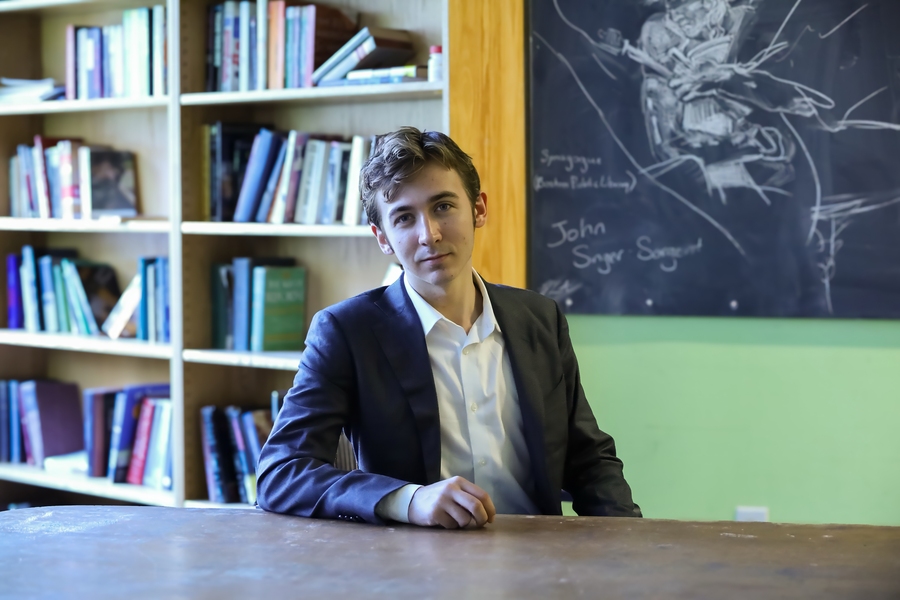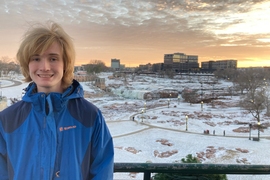At first glimpse, student Jack Carson might appear too busy to think beyond his next problem set, much less tackle major works of philosophy. The second-year undergraduate, who plans to double major in electrical engineering with computing and mathematics, has been both an officer in Impact@MIT and a Social and Ethical Responsibility in Computing (SERC) Fellow in the MIT Schwarzman College of Computer Science — and is an active member of Concourse.
But this fall, Carson was awarded first place in the Elie Wiesel Prize in Ethics Essay Contest for his entry, “We Know Only Men: Reading Emmanuel Levinas On The Rez,” a comparative exploration of Jewish and Cherokee ethical thought. The deeply researched essay links Carson’s hometown in Adair County, Oklahoma, to the village of Le Chambon sur Lignon, France, and attempts to answer the question: “What is to be done after catastrophe?” Carson explains in this interview.
Q: The prompt for your entry in the Elie Wiesel Prize in Ethics Essay Contest was: “What challenges awaken your conscience? Is it the conflicts in American society? An international crisis? Maybe a difficult choice you currently face or a hard decision you had to make?” How did you land on the topic you’d write about?
A: It was really an insight that just came to me as I struggled with reading Levinas, who is notoriously challenging. The Talmud is a tradition very far from my own, but, as I read Levinas’ lectures on the Talmud, I realized that his project is one that I can relate to: preserving a culture that has been completely displaced, where not destroyed. The more I read of Levinas’ work the more I realized that his philosophy of radical alterity — that you must act when confronted with another person who you can never really comprehend — arose naturally from his efforts to show how to preserve Jewish cultural continuity. In the same if less articulated way, the life I’ve witnessed in Eastern Oklahoma has led people to “act first, think later” — to use a Levinasian term. So it struck me that similar situations of displaced cultures had led to a similar ethical approach. Given that Levinas was writing about Jewish life in Eastern Europe and I was immersed in a heavily Native American culture, the congruence of the two ethical approaches seemed surprising. I thought, perhaps rightly, that it showed something essentially human that could be abstracted away from the very different cultural settings.
Q: Your entry for the contest is a meditation on the ethical similarities between ga-du-gi, the Cherokee concept of communal effort toward the betterment of all; the actions of the Huguenot inhabitants of the French village of Le Chambon sur Lignon (who protected thousands of Jewish refugees during Nazi occupation); and the Jewish philosopher Emmanuel Levinas’ interpretation of the Talmud, which essentially posits that action must come first in an ethical framework, not second. Did you find your own personal philosophy changing as a result of engaging with these ideas — or, perhaps more appropriately — have you noticed your everyday actions changing?
A: Yes, definitely my personal philosophy has been affected by thinking through Levinas’ demanding approach. Like a lot of people, I sit around thinking through what ethical approach I prefer. Should I be a utilitarian? A virtue theorist? A Kantian? Something else? Levinas had no time for this. He urged acting, not thinking, when confronted with human need. I wrote about the resistance movement of Le Chambon because those brave citizens also just acted without thinking — in a very Levinasian way. That seems a strange thing to valorize, as we are often taught to think before you act, and this is probably good advice! But sometimes you can think your way right out of helping people in need.
Levinas instructed that you should act in the face of the overwhelming need of what he would call the “Other.” That’s a rather intimidating term, but I read it as meaning just “other people.” The Le Chambon villagers, who protected Jews fleeing the Nazis, and the Cherokees lived this, acting in an almost pre-theoretical way in helping people in need that is really quite beautiful. And for Levinas, I’d note that the problematic word is “because.” And I wrote about how “because” is indeed a thin reed that the murderers will always break.
Put a little differently, “because” suggests that you have to have “reasons” that complete the phrase and make it coherent. This might seem almost a matter of logic. But Levinas says no. Because the genocide starts when the reasons are attacked. For example, you might believe we should help some persecuted group “because” they are really just like you and me. And that’s true, of course. But Levinas knows that the killers always start by dehumanizing their targets, so they convince you that the victims are not really like you at all, but are more like “vermin” or “insects.” So the “because” condition fails, and that’s when the murdering starts. So you should just act and then think, says Levinas, and this immunizes you from that rhetorical poison. It’s a counterintuitive idea, but powerful when you really think about it.
Q: You open with a particularly striking question: What is to be done after catastrophe? Do you feel more sure of your answer, now that you’ve deeply considered these disparate response to a catastrophic event — or do you have more questions?
A: I am still not sure what to do after world-historical catastrophes like genocides. I guess I’d say there is nothing to do — other than maintain a kind of radical hope that has no basis in evidence. “Catastrophes” like those I write about — the Holocaust, the Trail of Tears — are more than just acts of physical destruction. They destroy whole ways of being and uproot whole systems of meaning-making. Cultural concepts become void overnight, as their preconditions are destroyed.
There is a great book by Jonathan Lear called “Radical Hope.” It begins with a discussion of a Plains Indian leader named Plenty Coups. After removal to the reservation in the 19th century, he is quoted as saying, “But when the buffalo went away the hearts of my people fell to the ground, and they could not lift them up again. After this nothing happened.” Lear ponders what that last sentence is all about. What did Plenty Coups mean when he said “after this nothing happened?” Obviously, life’s daily activities still happened: births, deaths, eating, drinking, and such. So what does it mean? It’s perplexing. In the end, Lear concludes that Plenty Coups was making an ontological statement, in which he meant that all of the things that gave life meaning — all of those things that make the word “happen” actually signify something — had been erased. Events occurred, but didn’t “happen” because they fell into a world that to Plenty Coups lacked any sense at all. And Plenty Coups was not wrong about this; for him and his people, the world lost intelligibility. Nonetheless, Plenty Coups continued to lead his people, even amidst great deprivation, even though he never found a new basis for belief. He only had “radical hope” — which gave Lears’ book its name — that some new way of life might arise over time. I guess my answer to “what happens after catastrophe?” is just, well, “nothing happens” in the sense Plenty Coups meant it. And “radical hope” is all you get, if anything.
Q: There’s a memorable scene in your essay in which, during a visit to your community cemetery near Stilwell, your grandfather points out the burial plots that hold both your ancestors, and that will eventually hold him and you. You describe this moment beautifully as a comforting and connective chain linking you to both past and future communities. How does being part of that chain shape your life?
A: I feel this sense of knowing where you will be buried — alongside all of your ancestors — is a great gift. That sounds a little odd, but it gives a rootedness that is very removed from most people’s experience today. And the cemetery is just a stand-in for a whole cultural structure that gives me a sense of role and responsibility. The lack of these, I think, creates a real sense of alienation, and this alienation is the condition of our age. So I feel lucky to have a strong sense of place and a place that will always be home. Lincoln talked about the “mystic chords of memory.” I feel this very mystical attachment to Oklahoma. The idea that this road or this community is one where every member of your family for generations has lived — or even if they moved away, always considered “home” — is very powerful. It always gives an answer to “Who are you?” That’s a hard question, but I can always say, “We are from Adair County,” and this is a sufficient answer. And back home, people would instantly nod their heads at the adequacy of this response. As I said, it’s a little mystical, but maybe that’s a strength, not a weakness.
Q: People might be surprised to learn that the winner of an essay contest focusing on ethics is actually not an English or philosophy major, but is instead in EECS. What areas and current issues in the field do you find interesting from an ethical perspective?
A: I think the pace of technological change — and society’s struggle to keep up — shows you how important philosophy, literature, history, and the liberal arts really are. Whether it’s algorithmic bias affecting real lives, or questions about what values we encode in AI systems, these aren’t just technical problems, but fundamentally about who we are and what we owe each other. It is true that I’m majoring in 6-5 [electrical engineering with computing] and 18 [mathematics], and of course these disciplines are extraordinarily important. But the humanities are something very important to me, as they do answer fundamental questions about who we are, what we owe to others, why people act this way or that, and how we should think through social issues. I despair when I hear brilliant engineers say they read nothing longer than a blog post. If anything, the humanities should be more important overall at MIT.
When I was younger, I just happened across a discussion of CP Snow’s famous essay on the “Two Cultures.” In it, he talks about his scientist friends who had never read Shakespeare, and his literary friends who couldn’t explain thermodynamics. In a modest way, I’ve always thought that I’d like my education to be one that allowed me to participate in the two cultures. The essay on Levinas is my attempt to pursue this type of education.









